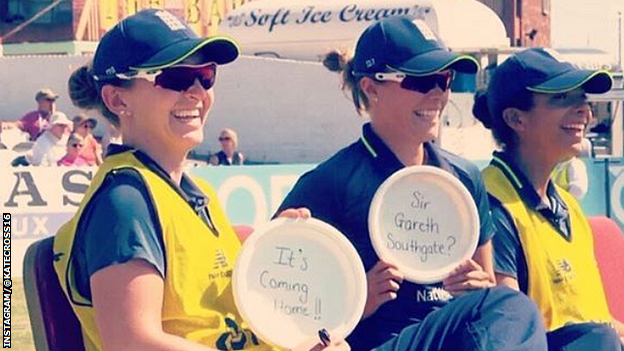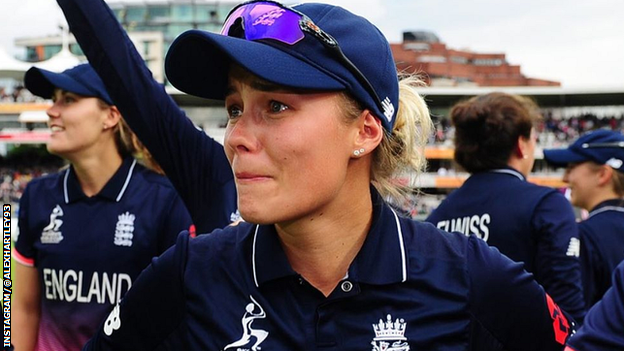Mental Health Awareness Week: Kate Cross and Alex Hartley on life on sidelines
- Published

Kate Cross (left) and Alex Hartley have been close friends for years
There are awkward silences and then there are awkward, two-hour drives with your best mate when one of you has been picked for a World Cup squad and the other hasn't.
That's what happened to England bowlers and best mates Kate Cross and Alex Hartley in 2017.
Left-arm spinner Hartley was part of the team that would eventually go on to lift the 50-over trophy at Lord's, while seamer Cross would miss out.
But the two had driven to Loughborough, where England's training camp is held, together. And they were heading back together too.
"It was, honestly, torture," Cross told BBC Sport.
"She hadn't told her mum and dad she'd been picked because she didn't want to ring them on the car phone so that I could hear. It was a bad journey."
Things have changed since 2017. Cross has spoken openly about her mental health struggles and her successful return to the England set-up, while Hartley was unable to look at her World Cup medal after losing her central contract in October.
"Overnight, I went from being a professional cricketer to not being. It was something I'd worked so hard for," Hartley says.
"You end up going 'well, I didn't go to school, I didn't go to college... what on earth am I going to do now?'"

2017 was always going to be huge for women's cricket in England. A home World Cup, the best teams in the world competing, a showcase finale at Lord's.
Cross was struggling. She hadn't played for England since 2016, in a match against Pakistan she describes as "hell".
"The innings was only three hours but I felt like I was on that cricket pitch for two days," she says.
"It dragged out. I thought, if this is my career and this is what everyone aspires to, then I'm doing it wrong."
Cross had opted not to go on that winter's tour of West Indies, breaking down in front of then-coach Mark Robinson in a changing room. She knew it was a deal-breaker; she considered "gritting my teeth" and going on tour to stake a claim for a World Cup spot.
"I was thinking, am I going to be in a worse off position that I might never play cricket again?" Cross says of that time.
"I got to the point where it all got too much. I kind of crumbled and ended up having that conversation with Robbo."
By 2017, Cross was back with England. The international women's set-up is based around Loughborough where, unlike the men, players train together every week. It brings players closer together but, with 21 central contracts, friends compete against one another for selection.
It was during a training session that Robinson pulled Cross to one side. Hartley says she knew straight away it wasn't good news.
Robinson told Cross she could go home. But Hartley was about to go into a World Cup squad meeting.
So Cross sat in the car park and waited.

The World Cup campaign itself was a difficult balancing act for Cross.
"Robbo always said we were welcome to come and bowl at the girls," she says. "I don't know how else you'd deal with that situation but, for us, it felt like they were trying to make us part of something we weren't part of."
Cross travelled to Derby for England's penultimate group match against New Zealand to practice. She did not watch any of the match - "I stayed for literally 10 minutes" - and was on the way home when England secured their semi-final spot with a 75-run win.
"Robbo rang and said why didn't you come in the dressing room and sing the team song with us?" she remembers.
"I find it hard singing the team song if I've been 12th man. So I thought I'm not in the squad, I'm not even in the kit… it'd be weird. I was glad, in a way, I was in the car."
Cross, along with Amy Jones and Tash Farrant, was a guest at the Lord's final on a day when her "emotions were all over the place".
She could barely follow India's run chase, settling instead for watching Peppa Pig on her iPhone with assistant coach Ali Maiden's young son. She cried when England clinched the final wicket and received a standing ovation from the 24,000-strong crowd.
Afterwards, the three were invited into the dressing room to join in the celebrations.
"Two of the coaches were having a photo on the Lord's balcony with the trophy and I took it for them," Cross explains.
"One of them said to me 'right, are you having one now?' and I said no. I would have felt a bit like a fan who had somehow ended up in the dressing room and had a picture with the trophy.
"In my head I was like, 'no, I'm gonna do that when I win it'."

Things have changed for both players since that day at Lord's.
Cross looked at other jobs during her break from cricket - she considered being a primary school teacher - but saying out loud that she would turn down a central contract, and the chance of a solid wage for the year, seemed ludicrous.
"One of the first sessions I did with our psych, he said to me, do you see yourself as Kate Cross, who is good at cricket, or Kate Cross the cricketer?
"I said well, I'm Kate Cross, the cricketer'. And he said that's probably where we need to start because that's so unhealthy.
"He said, having your job consume your life is so unhealthy and also, cricket was my hobby. So basically the thing that I found fun and the thing I was earning money from was consuming my life."
Cross went through what she calls "crappy, uncomfortable sessions" with a psychologist. Her parents sat in some sessions as she tried to explain to them why she was struggling so much.
"For them to see their daughter supposedly living out her dream and hating it so much and it causing so many problems… I imagine that must have been pretty horrible for them," she says.
Now, Cross says she is in the best mental state for 10 years or so. She has returned to the England set-up and is a regular in their 50-over side, with England's World Cup title defence taking place in February.
In a way, she and Hartley have flipped roles. It is Cross preparing for a World Cup while Hartley finds her way in a post-England world.
Despite playing a key role in the World Cup win, Hartley's form dipped afterwards and she admits that "deep down, I knew what was coming".
In late 2019, an England team member took Hartley out for coffee - "I can't go there any more!" - and told her that her England contract would not be renewed in January. There was the initial sadness, but anger followed.
"I don't feel like I was treated right in the two years that I wasn't playing at my best; not being allowed to work with the coaches I wanted to, for example," she says.
"I was angry. I said, 'don't ever let that happen to anyone else, because it's not fair'."
Hartley rang Cross before her parents to tell her. The two met for dinner and then Cross, in attempt to cheer her mate up, asked her what she wanted to do - anything from flying on holiday to having a night out.
Hartley's response?
"Shall we go to the gym?"

The gym was her refuge for a few weeks; it allowed her to avoid confronting what the future would be like without an England contract. For so long, she had been Alex Hartley, England cricketer. Now what?
"I have my World Cup shirt and medal framed on my living room wall. Walking in was horrible. I hated it," she says.
"I had to cover it up with a bedsheet. I felt embarrassed by it - I'd been so good at cricket and then all of a sudden, I got told I wasn't any more.
"I just couldn't look at it."

Alex Hartley took 10 wickets during the World Cup, second only to Anya Shrubsole for England (12)
Hartley is still working towards regaining her central contract, although the coronavirus pandemic and postponement of The Hundred is a blow.
She was part of the BBC's commentary team for the T20 World Cup in Australia but there are aspects of England life that she still misses.
"I was watching the World Cup highlights and I said to my dad, if my cricket career could be like the first 18 months, not performance-wise, just enjoyment-wise, I'd really miss it," she adds.
"But the memories that I've got at the minute of cricket are of me doing really badly and being in a really bad head space.
"And now I'm in a good head space, and I'm enjoying life again, I don't miss that aspect."
If you or someone you know has been affected by issues raised in this story, help and support is available at bbc.co.uk/actionline